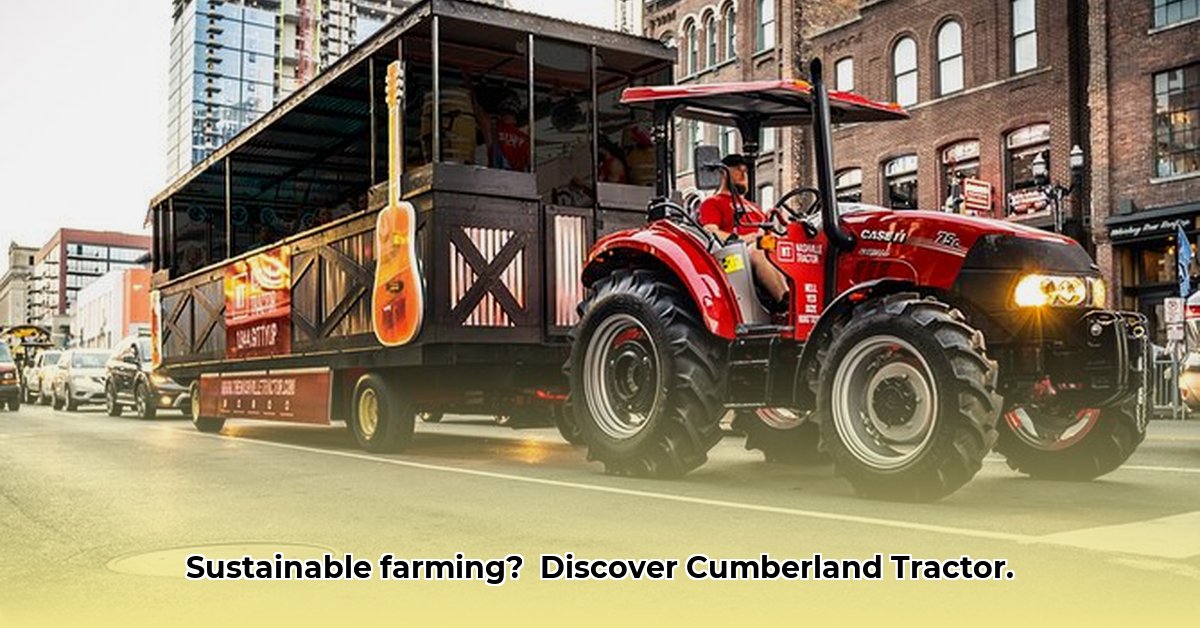
Choosing the right farm equipment in Middle Tennessee presents a complex challenge, particularly given the increasing focus on sustainable agricultural practices. This guide explores the landscape of sustainable farming equipment in Middle Tennessee, offering insights into available options and highlighting the need for more readily available information on specific dealerships like Cumberland Tractor Nashville. While comprehensive data on Cumberland Tractor’s offerings is currently limited, this analysis provides a broader perspective to inform farmer decision-making. For additional resources, check out this helpful Tennessee resource.
The Middle Tennessee Farm Equipment Landscape: A Blend of Tradition and Innovation
Middle Tennessee farmers largely rely on established equipment brands, often obtained through long-standing dealerships such as Parman Tractor. These dealers provide crucial support through readily available parts and robust repair networks. However, the accessibility of cutting-edge, environmentally friendly technologies remains unclear. The adoption rate of electric tractors, precision farming tools designed to minimize waste, and other sustainable innovations appears lower than in other regions. This lack of readily available data, particularly regarding Cumberland Tractor Nashville’s inventory and specific sustainable technology offerings, complicates a thorough market analysis.
A Farmer's Checklist: Key Considerations for Sustainable Equipment Selection
Making informed decisions about farm equipment necessitates a proactive approach. Farmers should:
Conduct Thorough Research: Begin by extensively researching available equipment options, comparing models, assessing long-term costs (including fuel efficiency and maintenance), and evaluating potential government incentives for eco-friendly technologies. A comprehensive cost-benefit analysis is crucial in this decision process.
Assess Farm-Specific Needs: Determine which technologies best address your farm's unique requirements. This might encompass electric tractors, smart irrigation systems, precision planting tools to minimize seed waste, or other specialized equipment targeted toward increasing efficiency and minimizing environmental impact.
Explore Funding Opportunities: Investigate financing options such as government subsidies, low-interest loans, or other programs designed to promote sustainable agriculture. Many resources are available that can ease the financial burden of adopting sustainable practices.
Prioritize Equipment Maintenance: Regular and proper maintenance is paramount. It extends the lifespan of equipment, reduces breakdowns, decreases environmental impact through optimized performance, and ultimately lowers operating costs over the long term.
Network and Collaborate: Engage with other farmers, agricultural experts, and organizations promoting sustainable agriculture in Middle Tennessee. Sharing knowledge, experiences, and best practices with others is invaluable in navigating the transition to sustainable farming practices.
Actionable Steps: A Guide to Sustainable Farming Implementation
To effectively adopt sustainable farming practices, follow these steps:
Comprehensive Research: Conduct thorough research on sustainable equipment options, comparing models, benefits, and long-term cost implications. (Estimated time investment: 20-40 hours)
Farm-Specific Needs Assessment: Identify the technologies best suited for your farm's unique requirements and operational scale. (Estimated time investment: 10-20 hours)
Funding Exploration: Investigate available financing options, including government incentives and loan programs specifically targeting sustainable agriculture initiatives. (Estimated time investment: 10-15 hours)
Preventative Maintenance: Establish a comprehensive preventative maintenance schedule to ensure optimal equipment performance and longevity. (Ongoing investment in time and resources)
Community Engagement: Network with other farmers, agricultural experts, and relevant organizations to share information and gain valuable insights. (Ongoing investment in networking efforts)
The Role of Dealerships: Enhancing Transparency and Sustainable Equipment Availability
Dealerships like Cumberland Tractor Nashville play a vital role in the adoption of sustainable farming practices. Greater transparency regarding their inventory of sustainable equipment is crucial. Dealerships must actively expand their offerings to include more environmentally friendly technologies and ensure their staff is adequately trained to assist farmers in making informed decisions. This increased transparency and support are essential elements in encouraging the broader adoption of sustainable agriculture technologies in Middle Tennessee.
The Future of Farming in Middle Tennessee: Embracing Sustainable Practices
Middle Tennessee agriculture is evolving, with increasing demand for sustainable practices. Farmers who proactively adopt these practices will be better positioned for long-term success. However, further research is needed to comprehensively understand the adoption rate of sustainable equipment in Middle Tennessee, including a detailed analysis of the offerings provided by key dealerships, such as Cumberland Tractor Nashville. This increased data availability would greatly benefit both farmers and policymakers working to promote sustainable agricultural development in the region.
Addressing Knowledge Gaps: Future Research Directions
It’s important to acknowledge the limitations of current data. The lack of publicly available information, particularly concerning Cumberland Tractor Nashville’s specific inventory and services, hinders a comprehensive market analysis. Future research efforts should focus on:
- Market Share Analysis: Determining the market share of sustainable farming equipment in Middle Tennessee.
- Case Studies: Documenting successful examples of sustainable farming practices in the region.
- Comprehensive Dealership Analysis: Conducting a thorough investigation into the offerings and practices of major dealerships, such as Cumberland Tractor Nashville, to better understand their role in promoting sustainable agriculture.
This guide offers a preliminary assessment of the sustainable farming equipment landscape in Middle Tennessee. By combining diligent research with informed decision-making, farmers can successfully navigate the transition to environmentally responsible agricultural practices, ensuring both financial prosperity and long-term environmental sustainability.